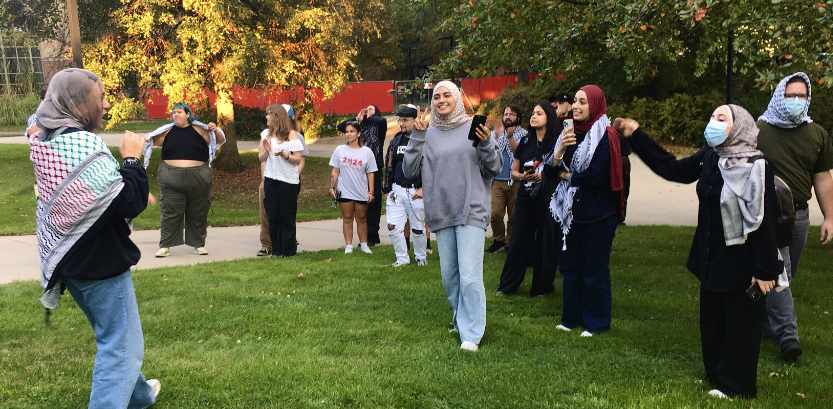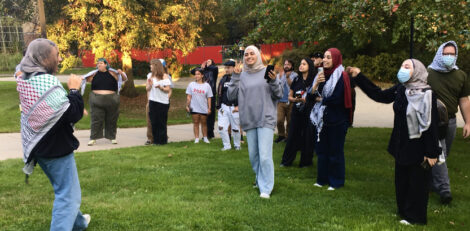Speaker draws protesters at YSU

YOUNGSTOWN — As the death toll continues to climb in the ongoing Israel-Hamas war, the conflict also has deepened feelings of those on both sides, a leading Holocaust scholar says.
“The war in Gaza is more divisive today than the war in Vietnam was in the late 1960s,” Norman J.W. Goda, a University of Florida professor of Holocaust studies who also specializes in modern European history, said. “This stirs passions not seen in world events, and passions that will not go away anytime soon.”
Calling the war that began with the Oct. 7, 2023, attack on Israel “dreadful,” Goda, of Gainesville, Florida, said he felt the conflict that has reportedly killed more than 66,000 Palestinians will be a source of division “throughout our lifetimes and beyond.”
The series of attacks from Hamas and other militant groups that day also coincided with the Jewish holiday of Simchat Torah.
That was one of the topics Goda broached in his presentation, “Is Israel Committing Genocide? A Skeptical Approach,” that he delivered Monday to more than 100 students, faculty and community members in Youngstown State University’s DeBartolo Hall.
Also Monday, the White House unveiled a 20-point plan for a ceasefire and a peaceful path forward in the Gaza Strip.
Even as early as December 1948, the year of Israel’s birth as a country, the notion of genocide was being politicized. Decades later, Palestine Liberation Organization President Yasser Arafat styled himself and the PLO as a revolutionary liberation movement, but was, in reality, a terrorist organization, Goda contended. He added that such a view was favored by Third World countries that had recently won their independence from colonialism, as well as the Soviet bloc.
Years later, efforts to again link Israel and genocide resurfaced.
“Genocide accusations really exploded with the war in Lebanon in 1982,” Goda said, referring to what also was known as the second Israeli invasion of Lebanon.
That war, which began June 6, 1982, was marked by Israeli military operations aimed at expelling the PLO from Lebanon and establishing a pro-Israeli government.
Goda’s one-hour lecture soon became heated when many students — especially those who are Palestinian — reacted angrily when they felt he unfairly stopped short of calling Israel’s actions in Gaza genocidal and, while admitting Israel committed crimes, instead, referred to it as a war. On several occasions, they became emotional and interrupted him with questions and comments.
Also, many students took umbrage with what they felt was Goda’s unduly harsh criticism of Francesca P. Albanese, the United Nations special rapporteur on the Occupied Palestinian Territories. Goda’s most scathing criticism of Albanese appeared to be reserved for what he contended was her claim that Israel was committing genocide, yet made no mention in her unfinished report of the World Food Programme.
Last October, the WFP, which has worked in Palestine for 34 years, launched emergency operations, and the organization has provided food and cash to more than 1 million Palestinians since the war started, according to its website.
Goda said that the biggest problem with getting food to northern Gaza was not the number of trucks available to deliver the essential needs, but that many of the vehicles had to navigate through combat zones after having driven through a port of entry, For example, early in the war, one truck was surrounded at a checkpoint and had to turn around; another one was looted and the driver was beaten up, he said.
Goda noted that Carl Skau, the WFP’s deputy executive director and chief operating officer, sought greater access for getting essential food to Gaza City in the northern region. In April 2024, Israel announced it would open the Erez crossing into northern Gaza and temporarily use the Port of Ashdod to increase the flow of humanitarian aid into that region.
Albanese also pressed the misleading narrative that 70% of the fatalities in Gaza were Palestinian women and children, Goda contended, adding that she relied on “settler colonialism,” in which settlers displace indigenous people of a colonized region, then form their own societies there.
Goda also discussed the June 8, 2024, operation in the Nuseirat refugee camp in central Gaza in which Israeli special forces rescued four Israeli hostages — Andrey Kozlov, Shlomi Ziv, Noa Argamani and Almog Meir Jan — from two apartment buildings. Accompanying the daylight raid was intense air and ground attacks that killed numerous Palestinians.
Some who accuse Israel of genocide distort the evidence, he said. For example, parts of two quotes from Yoav Gallant, the country’s former defense minister, about Gaza were omitted, including when he said Gaza “would never go back to what it was,” thus distorting Gallant’s premise, Goda contended.
Also, John R. Dugard, a South African international law professor, tried unsuccessfully to have Israel charged with genocide, he said. In January and May 2024, Dugard represented his country at the International Court of Justice, where he argued that the court had jurisdiction to hear South Africa’s claim that Israel was violating the Genocide Convention in Gaza.
Specifically, Dugard told the court that his country was bringing the case on behalf of the international community, that the court had jurisdiction regarding the matter because South Africa and Israel are both parties to the convention and that a dispute pertaining to Israel’s actions existed before South Africa filed its application.
Goda also mentioned Nabil Ramlawi, who, in March 1997 as the PLO’s representative to the U.N.’s Commission on Human Rights in Geneva, accused Israel of injecting 300 Palestinian children with the virus that causes AIDS. In addition, Ramlawi drew swift condemnation for also accusing the Jewish state of poisoning Palestinian schoolchildren and forcing thousands of abortions on women, according to the Jewish Telegraphic Agency.
At the end of Goda’s presentation, a group of mainly Palestinian YSU students displayed their ire about his stance on Israel’s role in the war. As they filed out of the auditorium, many of them chanted in unison, “Shame on you!” to him.
Afterward, Glenn Hall and Courtney Boyle, both of whom described themselves as “community members,” joined the group of students in front of DeBartolo Hall for a brief, peaceful protest in which they chanted “Free Palestine.”
“His presentation focused on tiny minutiae,” Hall said, adding that he felt people are continuing to be intentionally starved, something that is tantamount to a type of genocide.
Calling Gaza “an open-air concentration camp,” Hall added that Goda omitted the fact that even though food is reaching northern Gaza, the Israelis also are controlling how much people can eat, as well as how much food comes through the entry points at any given time.
Any countries that go to war have an obligation to take steps to minimize casualties, Hall said, adding that he feels committing war crimes and intentional starvation constitutes genocide.
“I am here to support Palestine, along with the friends and community members I’ve met,” Boyle said. “It’s offensive to talk semantics about genocide.”
Boyle added that she also wants Palestinian students at YSU to be protected from possible backlash for speaking out against Israel.


